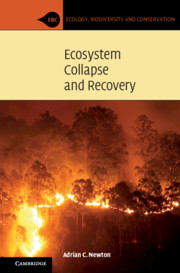5 - Synthesis
Published online by Cambridge University Press: 05 April 2021
Summary
This chapter provides a synthesis of the information presented in the previous chapters. First, the empirical evidence presented in Chapters 3 and 4 is evaluated in relation to the theoretical ideas described in Chapter 2. This is achieved through the evaluation of some tentative propositions, based on available theory. Selected issues that emerged during the review of empirical evidence are then considered, and an attempt is made to answer the overarching questions identified at the start of the book. A second section then examines the implications of our current understanding for conservation policy and practice. Specifically, how can we avert the collapse of ecosystems and support their recovery?
Keywords
Information
- Type
- Chapter
- Information
- Ecosystem Collapse and Recovery , pp. 286 - 376Publisher: Cambridge University PressPrint publication year: 2021
